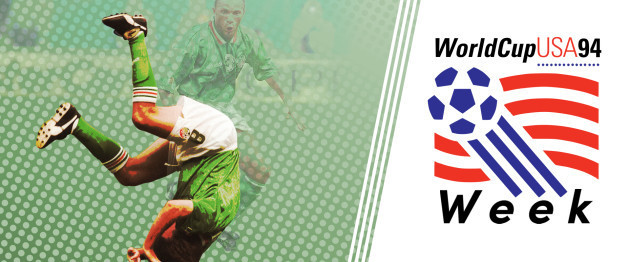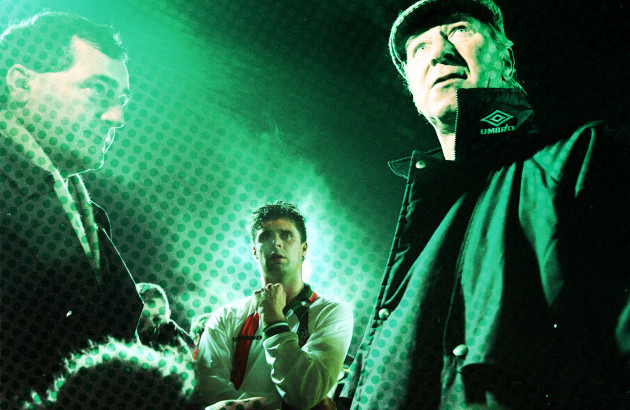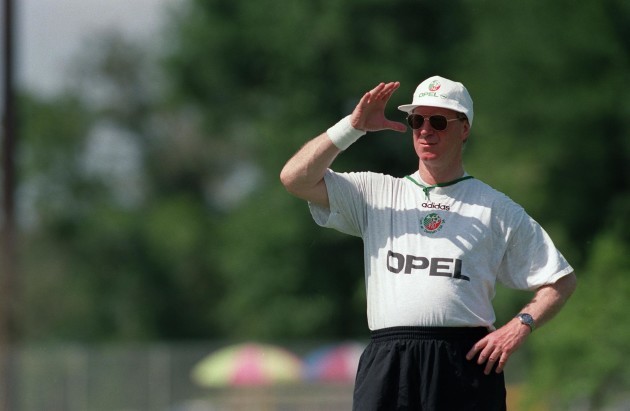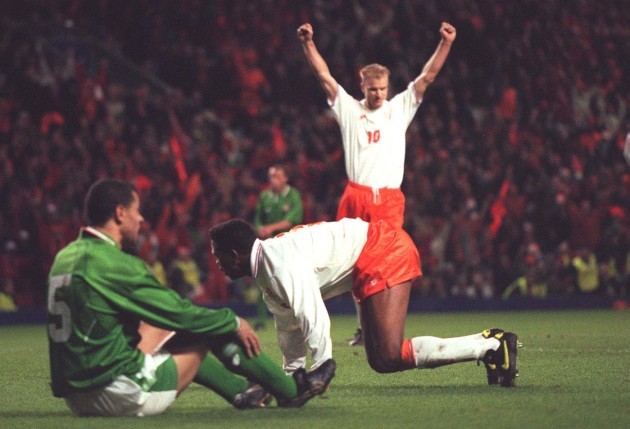This article is a part of The42′s USA 94 Week, a special series of commemorative features to celebrate the 25th anniversary of the 1994 Fifa World Cup. To read more from the series, click here >
THE 1994 WORLD Cup is generally remembered as a joyous occasion for Irish people, but spare a thought for Niall Quinn, who experienced the frustration of watching on from the sideline while feeling he should have been playing.
Quinn had been part of the squad for Euro ’88, coming off the bench for the final eight minutes of the 1-0 win over England, while being an unused sub for the other two games.
The Dublin-born striker played a more prominent role in the 1990 World Cup, appearing as a substitute against Egypt and starting the Netherlands match, scoring against the latter. Quinn also played the entire 120 minutes of the famous penalty shootout win over Romania, as well as featuring for the opening 53 minutes of the 1-0 loss to Italy.
By the time the 1994 World Cup rolled around, Quinn at 28 should have been approaching the peak of his career. Yet he scored just five goals in 15 league appearances in the season leading up to the competition, with his club Manchester City finishing just three points above the relegation zone.
Quinn had been absent for much of the campaign and City evidently missed the tall frontman. Their 16th-place finish was their lowest since 1987, as they managed just 38 goals in 42 games.
Despite missing much of the season, Quinn was the team’s joint-top scorer in all competitions. The club lost another talented attacker during that turbulent campaign, selling David White to Leeds in December ’93. The late David Rocastle moved in the other direction, but struggled to live up to expectations at the club.
Uwe Rosler and Paul Walsh were recruited too, but City ultimately limped over the line, having looked in serious danger of relegation at one point, with three draws in their final four fixtures ultimately just about enough to secure their safety.
Rosler was brought in on an initial three-month loan in March 1994 from FC Nürnberg, with his five goals in 12 appearances crucial in keeping City up (though they were ultimately relegated two seasons later, and they would spend five of the next six seasons out of the top flight).
Amidst this tense backdrop, it is perhaps understandable that Brian Horton’s side would try to use every advantage they could get.
So, despite the player himself feeling fit, as the 1994 World Cup approached, City insisted that Quinn would play no part in the competition.
My first memory is being so gutted to miss out,” Quinn tells The42. “I had a cruciate [injury], but I felt I would have been fit. In the end, Man City wouldn’t let me play. That’s the power the club had back then. If I got an independent opinion nowadays and they told me I was fit, I could have played. That’s just a little gripe I still have.
“Then it was a pity, because Tony Cascarino got injured. He was a centre forward. He had very little involvement because of that. Tommy Coyne, who was another striker at the time, he fell by the wayside [towards the latter part of Ireland's tournament] as well. So there was room for me to have played and I felt fit enough, but it didn’t happen.”
Ireland scored just twice over the course of the tournament — Ray Houghton’s famous winner against Italy and John Aldridge’s late consolation against Mexico. By the end of the group stages, Wolves’ David Kelly — ostensibly Ireland’s fourth-choice striker in the squad — was getting game time, replacing a 35-year-old John Aldridge in the 65th minute against Norway. If they had the aerial prowess of Quinn to rely upon, who knows how far they could have gone?
Quinn wasn’t entirely absent from proceedings, however. As a compromise, Man City let him train with the Irish squad in a bid to improve his fitness. He also worked for RTÉ during the tournament, serving as George Hamilton’s co-commentator during the memorable 1-0 win over Italy, among other games.
I remember, after that, I wasn’t part of the squad, but I was close by, seconded with the comedian Brendan O’Carroll. The two of us were hired by RTÉ to go out into the Irish communities in and around New York or Florida to bring stories back to RTÉ on the Irish community and how they were handling the World Cup et cetera, on our days off.
“Then, on matchday itself, I was working with the likes of the great Jimmy Magee to do some co-commentary and interviews. It was my first real foray into TV, and I enjoyed it in that sense, but obviously I’d have much preferred to be playing.”
While it is far from the most popular sport in the country even now, soccer in America was particularly niche during that era. Of course, it also didn’t help that one of the biggest sports-related stories in US history was breaking, with the police’s low-speed pursuit of former NFL star OJ Simpson — who was suspected and later acquitted of murder — taking place on 17 June, the day before the Ireland-Italy game.
“If you stopped 10 people in Times Square, they wouldn’t have known [the World Cup] was on,” Quinn says. “It hadn’t captured the imagination. But in fairness, it was the starting point for something bigger to happen in American football, and I think it worked. Years later, albeit with a couple of failed leagues, they’ve now got a league that’s in rip-roaring shape. I think that tournament had a lot to do with it.”
Perhaps fearful that his media duties could conflict with his responsibilities as a footballer, Quinn played a limited part in training.
“I was able to go training — Jack invited me. I would do some of the drills with the guys and then when they were doing tactical stuff, I’d come away. It was the best of both worlds, other than playing. A funny one to look back on.”
Despite the fantastic start in beating Italy, there was a sense, even before a further series of disappointing results in the Euro ’96 qualifiers prompted Charlton to step aside, that the team was past its peak.
Packie Bonner and Paul McGrath were both 34. All of the strikers bar Kelly were in their 30s. Ray Houghton and Ronnie Whelan were both 32, while team captain Andy Townsend was 30. A 38-year-old Kevin Moran even made the squad, though didn’t feature in the tournament and promptly retired once it ended.
“’92 was a great shame that we didn’t qualify for the Euros, we messed up in the end. Our first few qualifying games in 1994 we were at our best, then we let it slip. The team got old overnight almost. The second half of that campaign we struggled and obviously ended up scraping through against the North.
“I was out injured, other injuries happened. I can remember the Norway game, for instance, when our only sight of goal was when John Sheridan, who was a holding midfielder, got the ball. We weren’t quite right out there in some respects.
“Most people would say that the Italy match made up for it all and the performance in the Giants Stadium that day was enough. Although the other matches didn’t go well, that was a great memory from that time.”
Roy Keane was considered Ireland’s standout player in the tournament by some critics. In an Evening Herald column from the time, John Giles singled him out as Ireland’s best player in a disappointing collective display against Mexico, while the Irish Press gave him a 9.5/10 rating overall, suggesting he was Ireland’s player of the tournament. Quinn, however, believes the then-22-year-old Manchester United star was still not quite the force he would become.
I wouldn’t have spent a lot of time with Roy to that point. I’d played a few matches with him but I think by his own admission, he didn’t have the type of World Cup as the type of player that we knew he was later on.
“He obviously worked hard and did well, but didn’t stand out the way, for instance, Paul McGrath did. There were times in that set of games out there that we were outplayed in midfield. So he had far more highlights to look back on, but you could always tell he had the potential to be somebody very special. The reality was that played itself out over many years afterwards.”
25 years on, Quinn still sees some of his former Irish team-mates on occasion. Last September, there was a good turnout for a reunion arranged for all the individuals that had played competitively for their country under Jack Charlton.
Despite his disappointment at missing out in 1994, Quinn, who scored 21 goals in 92 caps for his country, is more than satisfied with his Ireland career overall. Aged 35, he got another chance to represent Ireland on international football’s biggest stage, coming off the bench in games against Germany, Saudi Arabia and Spain, and making a substantial impact in the process.
“1992 was a real disappointment, because we were pretty good then and we messed it up. You had ’88 in the Euros — great that we got there very luckily, Scotland won in Bulgaria on the last day, which fluked us over the line. We got going and qualified for ’90 pretty easily and got going from there.
“I think the play-off for the ’96 Euros at Anfield [where Ireland were beaten 2-0 by Netherlands], that was the real sign on the wall that the [Charlton] team had got old and changes had to be made.
I was lucky, I made the cut. Mick McCarthy came in, a few of us got kept on and had to prove ourselves all over again. I got injured not long after, I did my second cruciate, which was another blow.
“So having missed the ’94 World Cup, I missed chunks of Mick’s reign. I was in danger of missing out again, but then I came good. I went up to Sunderland in ’96, got injured straight away, but from ’97, ’98 onwards, it started to happen for me. I got back in and then went to [the World Cup in] 2002. So I played some part of the qualifiers for all four tournaments, played in three, so I didn’t do too bad.”
The42 is on Instagram! Tap the button below on your phone to follow us!




